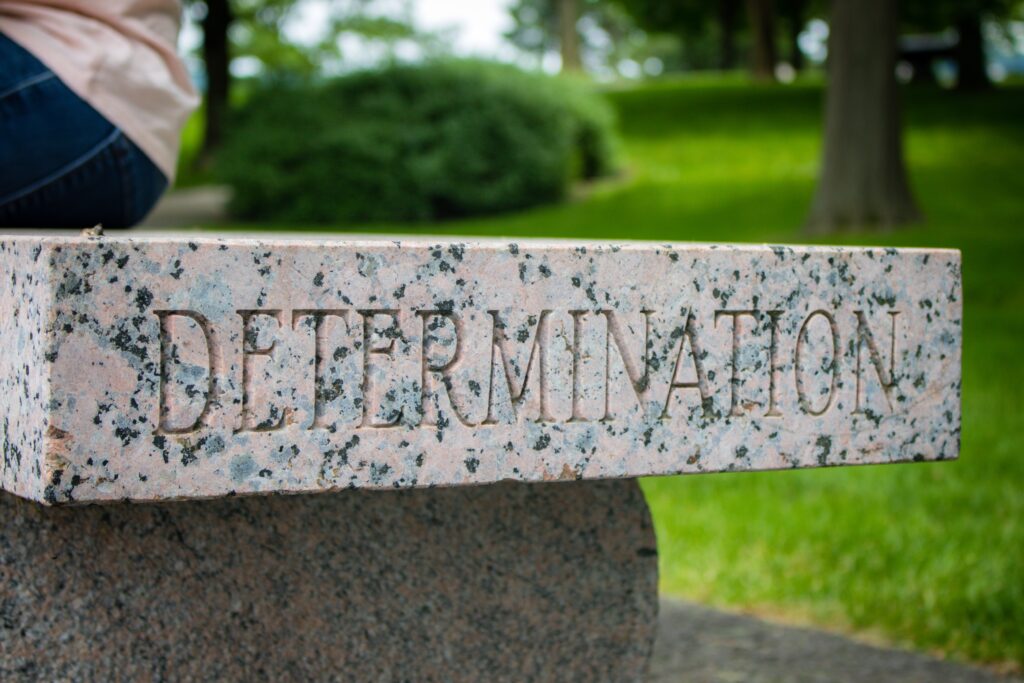
When Grit Grinds You Away
Grit. People who work hard, stick with things despite the odds…they’re said to have “grit”.
I used to think having grit was all good.
But grit is also the thing you really don’t want to get in your eyes. It’s the material that can be used to wear things away. If you have grit in the oil in your car, there’s something wrong. And too much grit can lead to burnout.
I remember one job I held years ago that was very challenging. Emergencies and crises were a standard part of the job, and that was ok. I kind of thrived on it. However, I had a supervisor who was entirely unsupportive. He would keep information from me, yell at our staff, and refuse to recognize the work I was doing. Month after month I kept telling myself: “I can make this work. After all, What doesn’t kill me just makes me stronger!” Right? Sound familiar?
Then I started having health problems. Getting out of bed in the morning was getting increasingly difficult. I gained weight. One colleague told me in a concerned manner: “You started out so happy when you joined us. Have we finally beaten that out of you?”
That grit which had helped polish me was now wearing me away. I was burning out. And I had to do something. More on that later.
So, blog reader, how are you? What’s it like to be you right now? Do me a favor. Look away from this blog and take a deep, slow breath. Ask yourself, how am I feeling emotionally? How am I feeling physically? Is my grit serving me, or is it burning me out?
Consider these questions:
– Do you tell people, even people you trust, that you are ok, even when you’re not?
– Have you experienced problems sleeping…too much or too little?
– How’s your stomach? Churning? Nausea? Heartburn?
– Have you been told you have high blood pressure?
– Have you gained or lost significant weight lately?
– Are you getting sick more often?
– Feeling more irritable or short-tempered?
– Have you been feeling a persistent sense of hopelessness?
To be clear, having the symptoms I listed above doesn’t necessarily mean that your grit is getting to you. There could be other things going on for you. If you’re concerned, please check with a doctor or therapist.
If reading this list makes you think that grit might be wearing you away, you’re not alone.
Consider the following statistics:
· A 2020 survey by the American Psychological Association (APA) found that 78% of American adults said the pandemic was a significant source of stress in their lives. In addition, 67% of adults said they had experienced increased stress over the course of the pandemic.
· A study by Gallup found that 76% of employees experience burnout at least sometimes, and 28% experience burnout “very often” or “always.”
· A survey conducted by Monster in 2020 found that 69% of employees reported experiencing burnout symptoms while working from home during the pandemic.
· According to a survey by Deloitte, 77% of respondents said they have experienced burnout at their current job, and 87% said they expect to experience burnout in the future.
· The World Health Organization (WHO) officially recognized burnout as a syndrome in 2019, defining it as “a syndrome conceptualized as resulting from chronic workplace stress that has not been successfully managed.”
We praise and encourage grit and resilience, and we should. Resilience is the ability to cope with and recover from adversity and stressful situations. Developing resilience can yield many benefits, including improved mental health, better physical health, improved performance, and stronger relationships.
But as leaders, if we’re only talking about working harder, grinding it out, we may be sending a message to our colleagues that their experiences of exhaustion and burnout don’t matter. Focusing exclusively on resilience can distract us from focusing on the systemic causes that result in our need for grit and resilience in the first place. And this particularly impacts marginalized people. For example:
o A person living in poverty says, or is told, they just need to work harder, “I need to show more grit”. But according to a 2020 report by the MIT Living Wage Calculator, approximately 42% of U.S. workers earn less than a living wage, and a 2021 survey by Bankrate found 45% of American adults reported having a side hustle. In addition to resilience, we need to focus on paying just wages.
o A person of color is told that they need to demonstrate grit and deal with microaggressions (a statement, action, or incident regarded as an instance of indirect, subtle, or unintentional discrimination against members of a marginalized group such as a racial or ethnic minority). Surveys have shown that 60% of Black Americans reported experiencing racial microaggressions on a daily basis, 78% of Asian Americans said they had experienced discrimination because of their race or ethnicity, 42% of LGBTQ people of color reported experiencing discrimination based on their sexual orientation or gender identity in the past year and 79% of Latino adults said they had experienced discrimination or unfair treatment based on their race or ethnicity. In addition to resilience, we need to focus on creating anti-racist workplaces and communities.
If grit is grinding you down, or if you are seeing your employees and colleagues burning out, here are some suggestions to help.
o Assemble a support team. They can include trusted family, friends, a doctor, a therapist or counselor, and a coach.
o Examine your self-talk. Where is your source of worth coming from? Is there a way to adjust your expectations of yourself while still meeting your needs and the needs of your dependents?
o Know when to say you’ve had enough, and you need a change.
o Practice mindfulness. Meditation can reduce stress and anxiety, improve mental health, increase self-awareness, improve physical health, enhance cognitive functioning, and improve relationships.
What can we do as leaders?
o Be empathic: Make efforts to understand what it’s like in someone else’s shoes, not what it would be like if YOU were in their shoes. When you ask, “How are you today?”, really listen to their answers, and ask follow-up questions as appropriate. To quote Ted Lasso (who misattributed the quote to Walt Whitman), “Be curious, not judgmental.” Curiosity about someone else is a powerful way of showing you care.
o Create conditions where people feel psychologically safe: Create environments where people can bring their whole selves to work.
o Model work behaviors that show both grit and self-care. Work hard and show your resilience. But also show that you care about your own well-being and the wellbeing of your employees. Establish boundaries for yourself and respect your employees’ efforts to maintain their boundaries. If you don’t have to send an email to an employee that they will receive after hours, use the “schedule send” feature.
o Please don’t tell minoritized people that they need to tough it out when faced with bigotry.
So, back to my work story. My job got so bad that I was getting quite ill. And yet somehow, I couldn’t wrap my head around the idea of quitting. Finally, I received my first performance review from my boss (after working there for 5 years), and I realized he had no idea of the work I had been doing. He had no idea of the grit that was needed for my position, no appreciation for what I had accomplished, and he had no idea of how burned out I was.
So, I decided to fire my boss. I quit. And I ended up creating a much healthier work situation for myself and learned that I am willing to make difficult choices to take care of myself. I realized I had my own back. I saw the line between resilience and burnout.
I developed a healthier understanding of “grit”, and its limits.
If you would like assistance developing your resilience and self-care and creating high performance work cultures that embody resilience and self-care, The Bailey Group can help.




